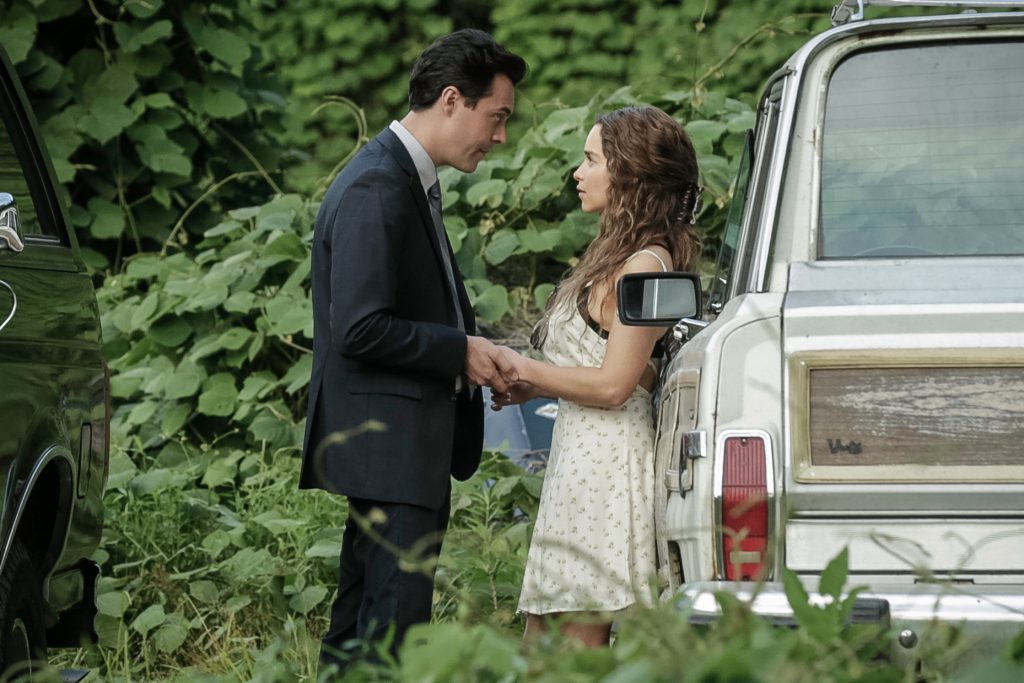April 9, 2024
by Carla Hay

Directed by Alex Garland
Culture Representation: Taking place on the East Coast of the United States, the action film “Civil War” features a predominantly white cast of characters (with some Latin people and African Americans) representing the working-class, middle-class and wealthy.
Culture Clash: During a civil war in the United States, a team of four war journalists take a tension-filled and dangerous road trip to the White House to try to get an interview with the U.S. president, who is under siege.
Culture Audience: “Civil War” will appeal primarily to people who are fans of the movie’s headliners, filmmaker Alex Garland, and war movies that have observations about political turmoil.

“Civil War” has some gripping action sequences, but it’s not a non-stop action flick about gun-toting heroes. It’s an effective commentary about war journalism, political unrest, and the psychological toll on people caught in the crossfire. The movie is set in the 21st century, but the themes in “Civil War” are timeless.
Written and directed by Alex Garland, “Civil War” had its world premiere at the 2024 SXSW Film and TV Festival. It’s not a typical war movie because much of the story takes place during a road trip from New York state to Washington, D.C., with journalists as the central characters. The movie gives an accurate depiction of how being a war journalist requires a certain mentality, skills and attitude, including the ability to document what’s happening without getting involved.
The movie begins with an unnamed U.S. president (played by Nick Offerman) privately rehearsing a speech by himself at the White House before he gives the speech live on camera. “Civil War” does not offer a detailed explanation for why there is a U.S. civil war in this story, but it’s mentioned in the movie that Texas and California have seceded from the Unted States and formed a faction called Western Forces, which want to bring down the U.S. government. As eventually revealed in the movie, this U.S president (who is in his third term) is currently under siege by Western Forces, which want to assassinate him.
However, during this speech, the U.S. president is trying to put on a brave face during this crisis. He says of the U.S. military defense against this Western Forces attack: “Some are calling it the greatest history in the history of mankind.” During his speech rehearsal, he changes this statement to: “Some are calling it the greatest history in the history of military campaigns.”
The movie then shows the four central characters who go on a “race against time” road trip to try to interview the U.S. president at the White House before he is possibly assassinated. Joel (played by Wagner Moura) is addicted to the adrenaline rush of being a war journalist. He is the one who plans to interview the U.S. president. Joel’s jaded photojournalist partner is Lee Smith (played by Kirsten Dunst), who is considered one of the top war photographers in the media.
The original plan was for Joel and Lee to go on this trip by themselves. However, they are accompanied by a New York Times journalist named Sammy (played by Stephen McKinley Henderson), who has an “elder sage” personality and uses a cane. Also along for the ride is an eager-to-learn aspiring photojournalist named Jessie Cullen (played by Cailee Spaeny), who thinks of Lee as one of her idols.
Lee isn’t very happy about adding these two people to the trip. However, Lee reluctantly agrees to have these extra two journalists join them in the press van. Sammy wants to prove that he’s useful in a media job that often discriminates against elderly and disabled workers. Joel thinks sensitive newbie Jessie can learn a lot from Lee.
Jessie and Lee met early on in the film when Lee came to Jessie’s aid during a violent street conflict between protesters and military police officers. During this conflict, Jessie accidentally got hit in the face with a police club while she was taking photos. Lee later found out that Jessie was staying at the same hotel when Jessie approached her in a lounge area to thank Lee for Lee’s help.
The rest of “Civil War” shows the harrowing events that happen during their dangerous and often-chaotic journey. However, there is also some dark comedy and a burgeoning camaraderie between these four journalists. It should come as no surprise that Jessie is the one in this group who goes through the biggest personality transformation because of what she experiences during the mayhem.
Jesse Plemons (who is Dunst’s real-life husband) has an uncredited role as a militant enforcer who holds certain people captive. Plemons’ role in the movie is not as big as his appearance in the “Civil War” trailer suggests: His screen time is less than 10 minutes. Two of Joel’s journalist friends named Tony (played by Nelson Lee) and Bohai (played by Evan Lai) have small but pivotal roles in the second half of the movie.
“Civil War” has several cast members who were also in Garland’s 2020 sci-fi/drama limited series “Devs.” Spaeny and Henderson are “Devs” alumni. “Devs” star Sonoya Mizuno has a brief role in “Civil War” as a rival journalist named Anya. Jin Ha also has small supporting role as an unnamed sniper who’s in a standoff with an unseen person or persons shooting from a large residential house. Karl Glusman is in the same scene as an unnamed spotter who’s working with the sniper.
“Civil War” invites viewers to think about how you or people you know would react if this civil war really happened in the United States. There are scenes in the movie that show how some people want to block out the realities of this war and pretend that it’s not happening. Others want to jump in and do what they can to fight for causes they believe in, even if it means they will die. Other people are somewhere in between and acknlowedge the war but are just trying to survive without taking sides. “Civil War” doesn’t try to pass judgment on what unfolds in the movie, but it is an impactful story that shows there are no easy answers when it comes to war.
A24 will release “Civil War” in U.S. cinemas on April 12, 2024.








